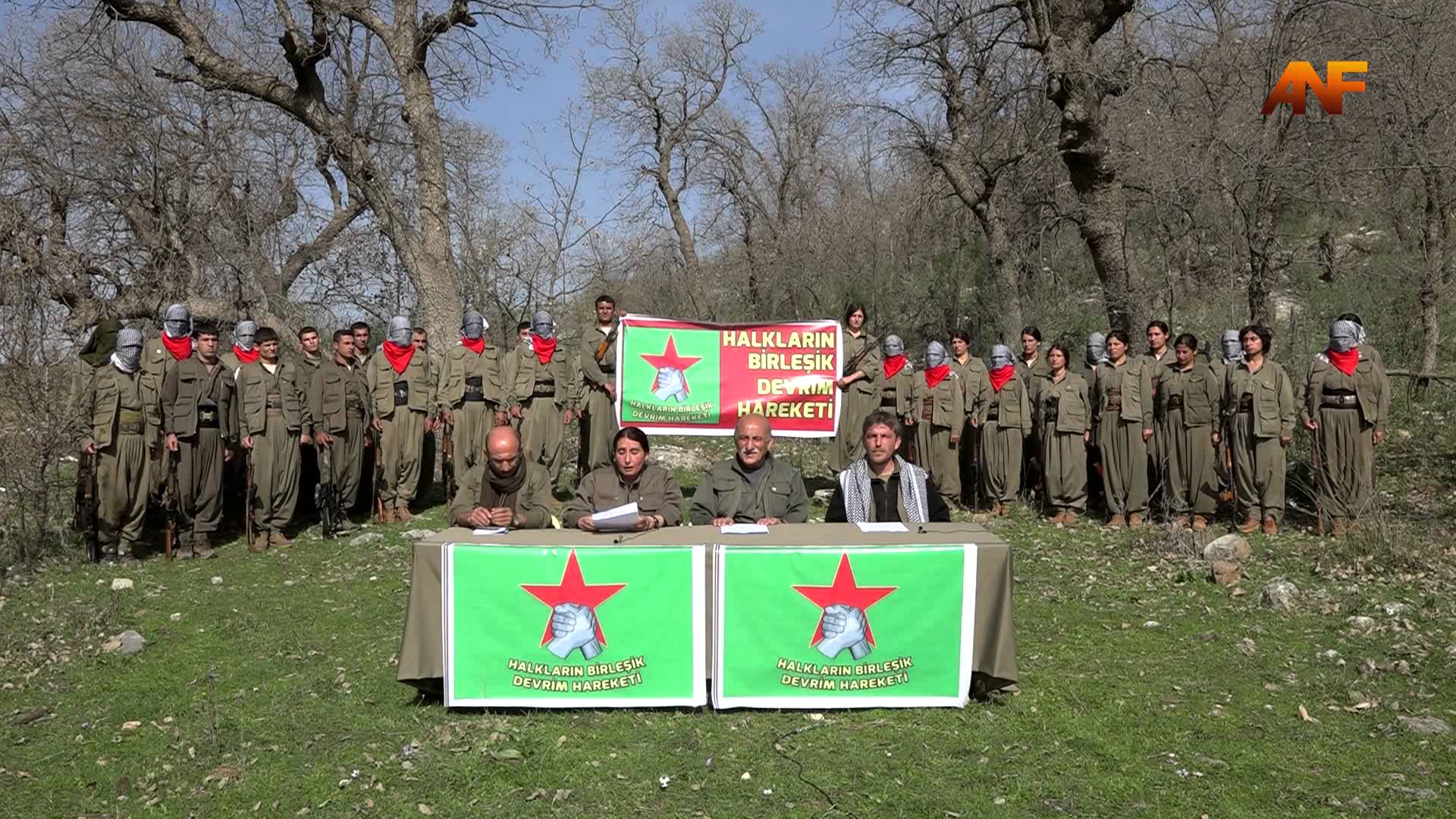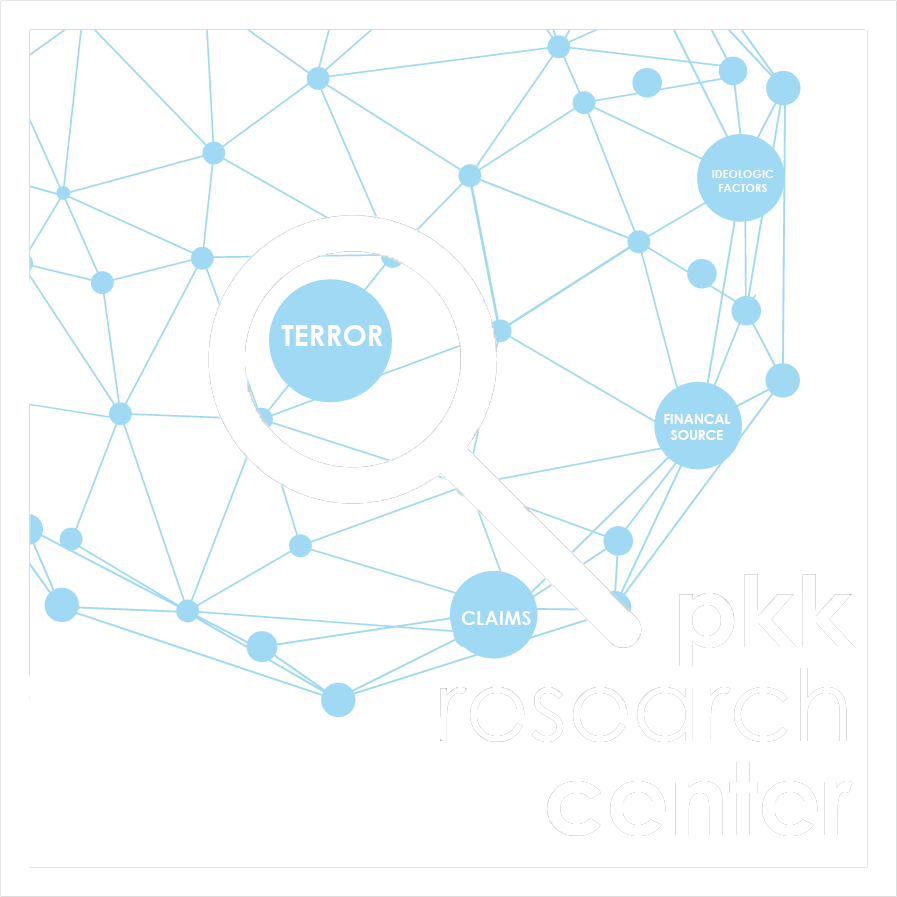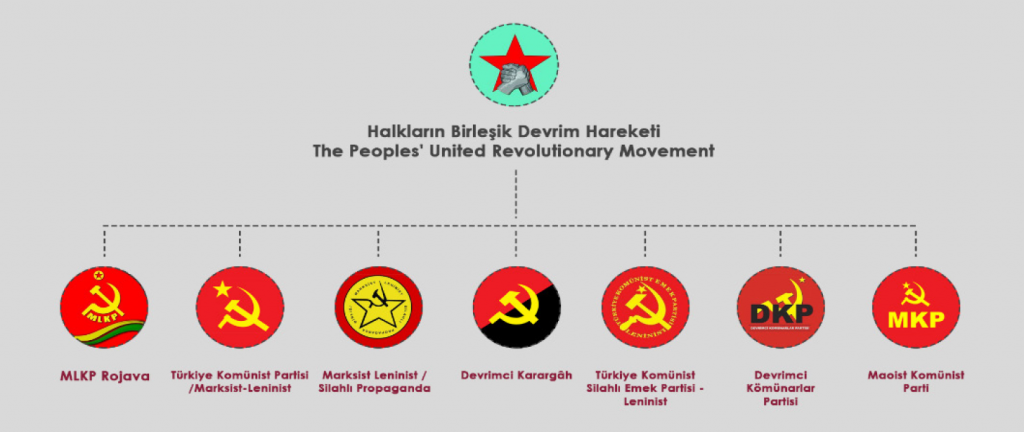

The Peoples’ United Revolutionary Movement (HBDH)
Halkların Birleşik Devrim Hareketi (HBDH)/The Peoples’ United Revolutionary Movement is a union of Communist Marxist-Leninists and Maoists. The union consists mostly of Kurds and Turkish Alawites. Its founding was announced on March 12, 2016 in Qandil Mountains, the headquarters of the PKK. During their founding declaration, Duran Kalkan, a member of the PKK Executive Committee, said that “the union will defeat the fascists and nationalists”. In the same statement, Kalkan also described the “Turkish state as a nationalist and imperialist evil state that necessitate a union of the opposition to defeat.” Indeed, the group tries to appeal to a broader audience beyond the traditional Kurdish communities. In several statements, the HBDH has called upon the Alawites, democrats, seculars, workers, the poor and all the opposition forces to unite in their struggle against the Turkish President Recep Tayyip Erdoğan and his allies. The group mostly operates in Syria, where it claims that the Rojava revolution is under the attack of Turkey, but it has also carried out assaults on military targets within Turkey. For instance, the HBDH claimed responsibility for an attack on Turkish soldiers in the city of Trabzon in 2017, killing four and wounding 11 others.
Marxist–Leninist Communist Party (MLKP)
Marksist-Leninist Komünist Partisi (MLKP)/Marxist–Leninist Communist Party was established on September 10, 1994 as a union of many Turkish and Kurdish Marxist groups. The party is banned from Turkey for committing acts of “terrorism” against civilians and officials. The organisation is particularly active among the Turkish diaspora in European countries, especially Germany, where it periodically organises annual party meetings. The MLKP was also among the first foreign groups to participate in the Syrian conflict. Its members were engaged in the war alongside the YPG as soon as 2013 in Ras Al-Ain and were later spotted in during the Battle of Kobani in 2014, the Battle of Tal-Abyad in 2015, and the Raqqa campaign in 2018. In February 2015, the MLKP issued a statement calling upon its supporters and all revolutionary youths around the world to join the Battle of Rojava in the YPG ranks. The group does not only engage in the Kurds living in Turkey, but have also welcomed foreigners among its ranks, such as the German national Ivana Hoffman, who was reported to have been killed in Tel Tamir on March 7, 2015. The MLKP generally entertain good relations with European leftist organizations: for instance, the Spanish Communist Reconstruction (Reconstrucción Comunista, abbreviated as RC) regularly sends volunteers to fight in the ranks of the organisation.
The Communist Party of Turkey/Marxist–Leninist (TKP/ML)
Türkiye Komünist Partisi/Marksist-Leninist (TKP/ML)/The Communist Party of Turkey/Marxist–Leninist was established on April 24, 1972 in Turkey by a group of young Marxists under the leadership of İbrahim Kaypakkaya after splitting from the Enlightenment Movement (PDA). In 2014, their armed wing Türkiye İşçi Köylü Kurtuluş Ordusu (TİKKO) sent volunteers to support the YPG during the Battle of Kobani against ISIS. The TİKKO contingent in Syria was led by Nubar Ozanyan (A.K.A. Orhan Bakırcıyan) until his death on August 14th, 2017 while fighting ISIS in Raqqa. The TKP/ ML was a member of the HBDH union but decided to withdraw later over fundamental disagreements on the nature of military operations inside Turkey.
The People’s Liberation Party-Front of Turkey (THKP-C)
Türkiye Halk Kurtuluş Partisi-Cephesi (THKP- C)/The People’s Liberation Party-Front of Turkey was formed in 1970 by Mahir Çayan with the aim of “fighting the capitalist system and the fascist regime.” Since, its establishment the group has carried out hundreds of bloody attacks against Turkish and foreign civilians, officials and politicians. The THKP-C lost most of its active members in the clashes with the Turkish army during the 1980s, and some of their old members moved to parliamentary politics and left the organisation afterwards. The party emerged back in Syria with the participation of Marxist–Leninist Armed Propaganda Unit (MLSPB) in the conflict. A battalion was created by Devrimci Karargâh, and MLSPB joined the IFB in support of the YPG.
The Turkish and Kurdish Communist movement is a complex phenomenon and has suffered from a lot of fraternal infights and defections in addition to their bloody conflict with the Turkish state andthe Nationalist Movement Party. The majority of groups that emerged during the 1960s and ‘70s have slowly disappeared over the last three decades, but the “Rojava Revolution” presented them with an opportunity to re-engage their traditional constituencies in a new struggle away from Turkish state authority.
The Communist Labor Party of Turkey/Leninist (TKEP/L)
The beginning of the Türkiye Komünist Emek Partisi/Leninist (TKEP/L)/The Communist Labor Party of Turkey/Leninist in northern Syria goes back to the second half of 2014 with the beginning of the ISIS attacks on the city of Kobani/Ain al-Arab in December 2014.
The first official center belonging to the TKEP/L was established on December 22, 2016 in the city of Ras al-Ain/Serê Kaniyê in the memory of Yaşar Bulut, the leader of the military wing of the party. He was killed in 1993 in Turkey. The party has another center in Kobani/Ain Al Arab, from which the party issued what can be considered its first statement from within Syria on October 12, 2015.
During the clashes between the Turkish state and the Kurdistan Workers’ Party (PKK) in the district of Nusaybin, TKEP/L sent threatening messages to some of the city’s people who had collaborated with the Turkish army as they entered the city. During the reading of this statement the walls around the fighters were decorated with the pictures and flags of TKEP/L, but the statement was released in the name of “YPS -Civil Protection Units” (PKK’s urban youth wing). Originally the YPS was called YDG-H and they were incorporated into the Civil Protection Units (YPS) in January 2016. Militants who used to be in the YDG-H but who are now in the YPS tend to be in their teens and early twenties and have generational differences with the veteran PKK commanders.
TKEP/L continues to release regular statements from its headquarters in the city of Ras al-Ain/Serê Kaniyê concerning memorial events for Turkish and Kurdish leftist organizations.
The Revolutionary Communard Party (DKP)
Devrimci Komünarlar Partisi (DKP)/ The Revolutionary Communard Party was formed on February 4, 2016, through the union of Türkiye Devrim Partisi/Turkish Revolution Party and “Kurtuluş Hareketi.”
In its first statement, the party called on Kurds, Alawites, secularists and supporters of the CHP to acquire unlicensed weapons to prepare themselves for self-defence before it became too late, and while this armament was occurring, the party advertised the expertise and capabilities of its members in the field of armaments and training, leading to the arrests of six DKP supporters were arrested in Izmir city on June 1, 2017, on charges of belonging to the party and the “United Freedom Forces (BÖG).”
The Leader of the DKP, Ulaş Bayraktaroğlu, was killed during the SDF/YPG campaign in the ISIS capital of Raqqa in northern Syria on April 10, 2017. Many neighborhoods in Istanbul witnessed marches by leftists glorifying and praising him after his death. It is worth mentioning that Bayraktaroğlu was arrested in the course of the Gezi Park protest in Istanbul after he led protests there and attacked police with molotov cocktails, before being released after several months of detention, Bayraktaroğlu was also a member of the central leadership committee of the Socialist Democratic Party (SDP), and was the general commander of BÖG.
Other groups which took part in the formation of HBDH but did not take roles in the Syrian war were:
- Maoist Communist Party
- Marxist–Leninist Armed Propaganda Corps- Revolutionary Front
- Revolutionary Headquarters
- Social Insurrection (SI)
- The Union of Revolutionary Communists in Turkey
Some other groups joined the battle in an individual capacity and are rebuilding their networks in Syria. For many among them, Rojava is now their new home, and the PYD/YPG led project is a leftist paradise they cannot claim in Turkey. Nonetheless, they are still active in their original communities and regularly comment on domestic affairs.
Source: AlSharq Forum

